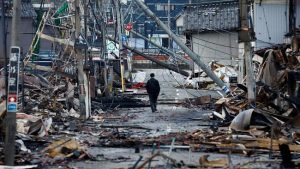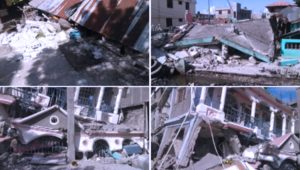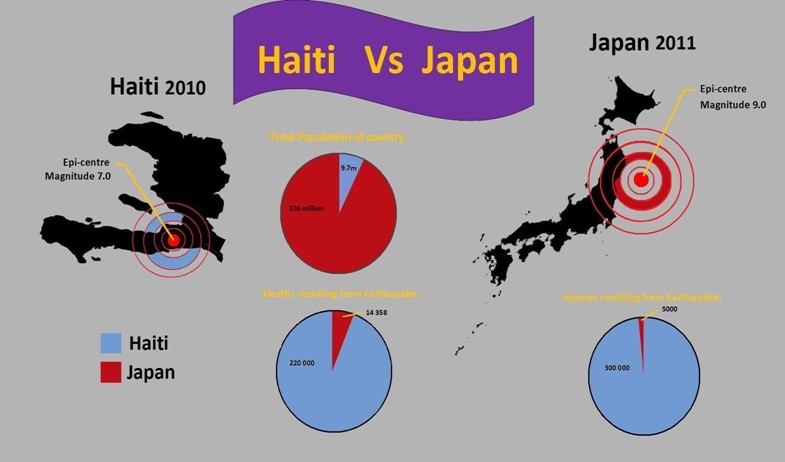[ADDED on 6th Oct 2015]: This post is more about the subjective coverage of the two disasters as I’ve experience in the media, not about donations pledged by international organisations or similar outcomes.
In the previous post, I mentioned some of the ways in which our response to the Haiti earthquake was muted when compared proportionately to the current one in Japan. Now I will go into a few of the reasons why something like the Japan earthquake have gotten such a large response (compared with responses to other larger earthquakes and other much larger disasters).
Before I begin I think it’s important to note as many reasons as possible and delve into the complexity of human reactions to such disasters. As opposed to just saying “poor country vs rich country plus some racism”. Not that these are invalid, in fact they are at the top of my list below. But I’m hoping to paint a broader picture.
The other important thing is to look at both social and cognitive reasons for the reaction. Social reasons would involve items like racism, which may apply to a particular situation (ie. these two particular countries’ earthquakes in comparison) but not to every similar situation. Cognitive reasons are the more general human biases and heuristics which are likely to occur more universally. Also all of these are about the humanitarian impact of the natural disaster so nuclear meltdowns aside…
- Racism: one of the more obvious ones, large-scale calamities involving large groups of black people get a disproportionately low amount of coverage.
- Reaction to poverty: countries perceived to be part of the “Third World” (a questionable distinction) get a lot less attention. Especially a place like Haiti which is almost “Fourth World”. We also seem to be a lot more used to poor countries getting those types of occurences but when it’s Japan it’s perceived as sudden and hence more “undeserved”.
- Previous standard of life: a country that’s almost a warzone conditions us to be used to the fact that people are already dying there, so we don’t consider the change in people’s lives to be as dramatic. To quote a comment on my Facebook wall “Haiti was a shithole with an unstable political system, no infrastructure and appalling standards of living long before its earthquake”.
- The dictator defence: If I donate money it’ll just go to some dictator. I’ve put it like that because while this is a problem (especially in countries with unstable politics), I’ve often seen it used almost as an excuse to do nothing.
- Similarity of lifestyle: we can identify more with people in Japan who live a largely urbanised, mechanised, internetised lifestyle than we can with people in Haiti when they’re raising chickens as a last resort to get over their desperate agricultural situation.
- Availability of images/coverage: in a country with more infrastructure there is more opportunity for reporters to export images and that’s what really tugs at the heart strings.
- Prior knowledge of country: you probably know a reasonable amount about Japan, at least in terms of superficial stuff like its location, cuisine, language, sumo, origami, karate, ikebana, samurai and so forth. How much are you (as a typical person) likely to know about Haiti? Can the average person even find Haiti on a map? (Of course many can’t even find Japan but still…)
- Travel/tourism: as per the previous one. Even if you haven’t been to Japan yourself, chances are you know someone who’s been to Japan. Do you know anyone who’s been to Haiti? Probably not.
- Economic impact: we are all economically tied to Japan so the aftermath can’t be forgotten since it will keep reminding us of itself. On the other hand, several million Haitians can all get gang-raped and killed in the tent camps without it affecting anyone’s retirement stock portfolio.
- Scope insensitivity: See this post on LessWrong. Our reaction to 100,000 deaths is not 10 times greater than our reaction to 10,000 deaths. The law of diminishing returns (in concern/compassion) applies here and I think that’s probably at the root of many of the above. It even looks like a small difference on paper, just one extra zero. Intellectually we know it’s not the case but it seems our compassion is driven by our gut and by social cues.
- Disasters are “sexy”: at least over and above the less dramatic tragedies that take many more lives.


Thoughts?





0 Comments